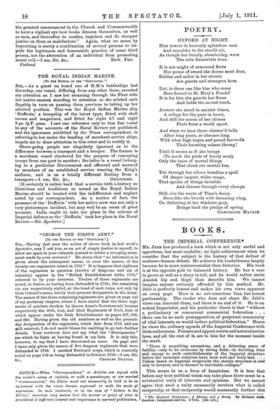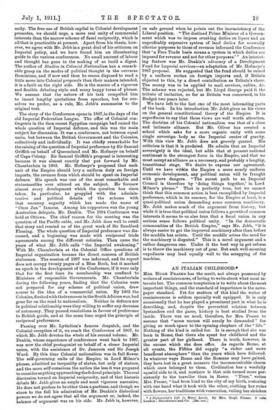BOOKS•
THE IMPERIAL CONFERENCE.* Mn. JEBB has produced a book which is not only useful and opportune, but most readable; no light achievement when we
consider that the subject is the history of that dullest of matters—human debate. He achieves his readableness largely because he is more controversialist than historian. His work is at the opposite pole to balanced history. He has a case to prove as well as a story to tell, and he would rather smite Amalek hip and thigh than describe him. We cannot imagine anyone seriously offended by this method. Mr. Jebb is perfectly honest and makes his own views apparent on every page. Here is no sub-conscious bias, but honest partisanship. The reader who does not share Mr. Jebb's views can discount them, and there is an end of it. He is an ardent Imperialist, and his particular thesis is that " without a preliminary or concurrent commercial federation . . . there can be no such presupposition of perpetual community of vital interests as would induce political federation." Hence he views the ordinary agenda of the Imperial Conference with little enthusiasm. Patents and appeal courts and naturalization laws, and all the rest of it are to him for the moment beside the mark.
"There is something anomalous, and a deterring sense of futility—only to be overcome by strong faith—in devoting time and energy to such embellishments of the Imperial structure before the economic relations have been well and truly laid. . . . Unless based on Imperial reciprocity the stately structure is real only to lawyers, and is doomed to inevitable collapse."
This seems to us a form of fanaticism. It is true that before any true political union can take place there must be a substantial unity of interests and opinions. But we cannot agree that such a unity necessarily involves what is called reciprocity, or that reciprocity would necessarily further this • The Imperial Conference : A History and a Study. By Richard Jebb. London : Longmsna and Co. 2 Yobs. [25a. net.] unity. The free use of British capital in Colonial development promotes, we should urge, a more real unity of commercial interests than the narrow scheme of fiscal reciprocity, which is all that is practicable at present. Apart from his thesis, how- ever, we agree with Mr. Jebb in a great deal of his criticism on Imperial policy, and we have found him an illuminating guide to the various conferences. No small amount of labour and thought has gone to the making of so lucid a digest. The author of Studies in Colonial Nationalism has a remark- able grasp on the modes of political thought in the overseas Dominions, and if now and then he seems disposed to read a little more into Colonial proposals than their makers intended, it is a fault on the right side. He is the master of a vigorous and flexible debating style and many happy turns of phrase. We assume that the nature of his task compelled him to insert lengthy quotations from speeches, but for our- selves we prefer, as a rule, Mr. Jebb's summaries to the original text.
The story of the Conference opens in 1887, in the days of the old Imperial Federation League. The offer of Colonial con- tingents in the then recent Egyptian campaign had raised the whole question of Imperial defence, and this was the main subject for discussion. It was a conference, not between equal units, but between the British Government and the Colonies, collectively and individually. It was chiefly remarkable for the raising of the question of Imperial preference by Sir Samuel Griffith on behalf of Queensland and Mr. Hofmeyr on behalf of Cape Colony. Sir Samuel Griffith's proposal is interesting because it was almost exactly that put forward by Mr. Chamberlain in 1903. Mr. Hofmeyr's proposed that each unit of the Empire should levy a uniform duty on foreign imports, the revenue from which should be spent on Imperial defence. His speech was one of the most remarkable and statesmanlike ever uttered on the subject. He foresaw almost every development which the question has since taken. In particular, he grappled with the adminis- trative and political details of the scheme with that uncanny sagacity which has made the name of " Onze Jan " famous. Among his supporters was the young Australian delegate, Mr. Deakin. The 1894 Conference was held at Ottawa. The chief reason for the meeting was the question of the Pacific cable, and Mr. Jebb does well to retell that story and remind us of the great work of Sir Sandford Fleming. The whole question of Imperial preference was dis- cussed, and a beginning was made with reciprocal trade agreements among the different colonies. Then came the years of what Mr. Jebb calls " the Imperial awakening." With Mr. Chamberlain at the Colonial Office questions of Imperial organization became the direct concern of British statesmen. The session of 1897 was informal, and its report does not occupy twenty pages of a Blue Book, but it marked an epoch in the development of the Conference, if it were only that for the first time its membership was confined to Ministers of responsible Governments. Mr. Chamberlain during the following years, finding that the Colonies were not prepared for any scheme of political union, drew nearer to the idea of a commercial union. By 1902 the Colonies, flushed with their success in the South African war, had gone far on the road to nationalism. Neither in defence nor in political relationship were they willing to suffer any decrease of autonomy. They passed resolutions in favour of preference to British goods, and at the same time urged the principle of reciprocal preferences.
Passing over Mr. Lyttelton's famous despatch, and the Colonial reception of it, we reach the Conference of 1907, to which Mr. Jebb devotes the whole of his second volume. Mr.
Deakin, whose experience of conferences went back to 1887, was now the chief protagonist on behalf of a closer Imperial
union, with the assistance of Dr. Jameson and Sir Joseph Ward. By this time Colonial nationalism was in full flower. The self-governing units of the Empire, in Lord Milner's phrase, admitted no inequality of status, but only of stature, and the more self-conscious the nation the less it was prepared to consider anything approaching the federal principle. The real discussion turned on Imperial reciprocity, and of that historic debate Mr. Jebb gives an ample and most vigorous narrative. He does not profess to be other than a partisan, and though we share to the full his admiration of Mr. Deakin's dialectical powers we do not agree that all the argument or, indeed, the balance of argument was on his side. Mr. Jebb is, however,
on safe ground when he points out the inoonsistency of the Liberal position. " The destined Prime Minister of a Govern- ment which was to impose crushing duties on liquor and an unprofitably expensive system of land duties for avowedly ulterior purposes to those of revenue informed the Conference that a Free Trade basis means a system in which duties are imposed for revenue and not for other purposes.' " An interest- ing feature was Mr. Deakin's advocacy of a Development Fund for Imperial services—an adaptation of Mr. Hofmeyr's 1887 proposal. He suggested that the fund should be raised by a uniform surtax on foreign imports and, if Britain objected to this, by a direct contribution as Britain's share. The money was to be applied to mail services, cables, &c. The scheme was rejected, but Mr. Lloyd George paid it the tribute of imitation, so far as Britain was concerned, in his Budget two years later.
We have left to the last one of the most interesting parts of the book. In his introduction Mr. Jebb gives us his views on the general constitutional theory of the Empire. It is superfluous to say that these views are well worth attention. The doctrine of his Colonial nationalism was that of a close and intimate alliance. But Mr. Oliver has created a school which asks for a more organic unity with some single sovereign body as the Imperial centre of gravity. With this view Mr. Jebb does not gravely quarrel. His criticism is that it is predated. He admits that an Imperial sovereignty is the ideal, but adds that at present national sentiment is the strongest force in the Empire, and that we must accept an alliance as a necessary, and probably a lengthy, transitional stage. We desire to express our agreement. Until we have within the Empire a more nearly uniform economic development, any political union will be fraught with grave dangers. "The surest path to an Imperial Council is therefore by doing things together,' in Lord Milner's phrase." That is perfectly true, but we cannot think that this common action is best exemplified by Imperial preference, which in its essence, for the Empire at least, is a quasi-political union demanding some common machinery. Mr. Jebb makes much of the argument from history, but while it is true that political union follows a growth of common interests it seems to us also true that a fiscal union in any serious sense follows political unity. "In the democratic communities of the British Empire," says Mr. Jebb, "it is always easier to get the improved machinery after than before the muddle has arisen. Until the muddle arises the need for the machinery is disputed." This is a novel argument and a rather dangerous one. Under it the best way to get reform is to throw the machinery out of gear. But such well-meaning expedients may lead equally well to the scrapping of the machine.















































 Previous page
Previous page